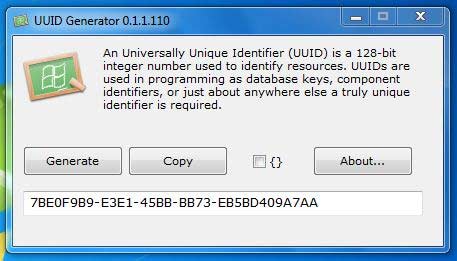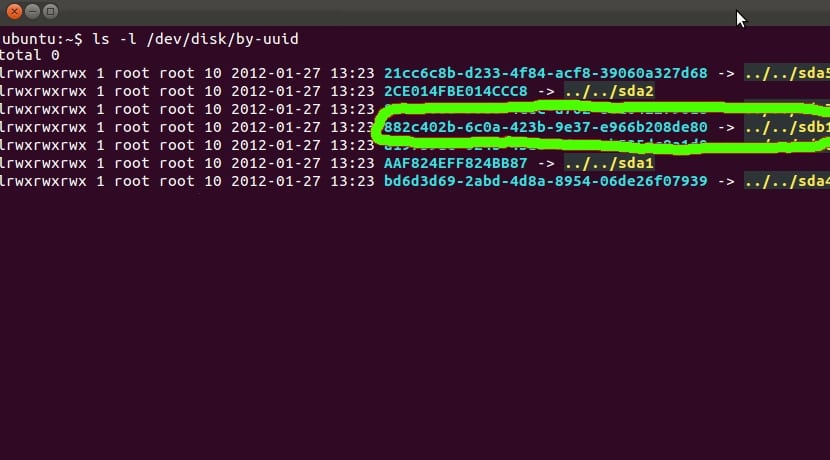

After a bit of searching, I found this related discussion where it is explicitly mentioned that the node.id property is indeed a UUID.Īdding the information provided by frostschutz in a comment:Īs an alternative to the uuidgen/ libuuid approach, you can make use of an interface exposed by the Linux kernel itself to generate UUIDs: $ cat /proc/sys/kernel/random/uuid It is possible to force the generation of one of these two UUID types by using the -r or -t options.Īddendum: The OP had provided a link in the comments to the documentation for Presto DB. Otherwise, it will choose a time-based UUID. By default uuidgen will generate a random-based UUID if a high-quality random number generator is present. There are two types of UUIDs which uuidgen can generate: time-based UUIDs and random-based UUIDs. The new UUID can reasonably be considered unique among all UUIDs created on the local system, and among UUIDs created on other systems in the past and in the future. The uuidgen program creates (and prints) a new universally unique identifier (UUID) using the libuuid(3) library. For example, I recently wrote a simple script to generate a set of UUID using. Specified in the corresponding Arch Linux package.On Linux, the util-linux/ util-linux-ng package offers a command to generate UUIDs: uuidgen. As long as you do not move or copy the virtual machine to another location, the UUID remains constant. This UUID is generated when you power on or reset the virtual machine.
UUID GENERATOR LINUX MANUAL
License, except for the contents of the manual pages, which have their own license The UUID is based on the physical computer's identifier and the path to the virtual machine's configuration file. The website is available under the terms of the GPL-3.0 Using mandoc for the conversion of manual pages. This UUID library is an yet another attempt to reimplement the wheel, but instead of outstanding algorithm it wraps the Linux kernel implementation of UUID v4 generator.

Package information: Package name: core/util-linux Version: 2.38.1-4 Upstream: Licenses: GPL2 Manuals: /listing/core/util-linux/ Table of contents go-uuid - A wrapper for Linux kernel UUID v4 generator. The uuidgen command is part of the util-linux package whichĬan be downloaded from Linux Kernel Archive. Uuidparse(1), libuuid(3), RFC 4122 REPORTING BUGSįor bug reports, use the issue tracker at. Uuidgen was written by Andreas Dilger for Interpret name name as a hexadecimal string. a random-based UUID if a high-quality random number generator is present. Values or values which shouldn’t be disclosed directly. There are two types of UUIDs which uuidgen can generate: time-based UUIDs and. It is, therefore, a predictable value which mayīe useful when UUIDs are being used as handles or nonces for more complex Of the concatenation of the namespace UUID and the name value, hashed with

UUID, or else an alias to one of the well-known UUIDs defined in RFC 4122, sha1 options, followed by -namespace namespace and The third type of UUID is generated with the -md5 or Is possible to force the generation of one of these first two UUID types by Share Improve this answer Follow answered at 15:13 Strahinja Kustudic 656 7 8 Not sure why this isnt the top comment. Otherwise, it will choose a time-based UUID. To only get the UUID of a specific disk device (for example to be used in a script) you can use: sudo blkid -s UUID -o value /dev/sdXY where /dev/sdXY is the name of the device. Uuidgen will generate a random-based UUID if a high-quality random

Time-based UUIDs, random-based UUIDs, and hash-based UUIDs. There are three types of UUIDs which uuidgen can generate: System, and among UUIDs created on other systems in the past and in the The new UUIDĬan reasonably be considered unique among all UUIDs created on the local Unique identifier (UUID) using the libuuid(3) library. The uuidgen program creates (and prints) a new universally Uuidgen - create a new UUID value SYNOPSIS


 0 kommentar(er)
0 kommentar(er)
